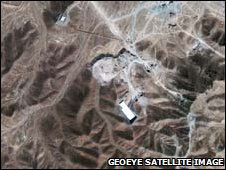
Iran's second uranium enrichment facility came to light in September
|
The UN nuclear watchdog's governing body has passed a resolution condemning Iran for developing a uranium enrichment site in secret. The International Atomic Energy Agency (IAEA) also demanded that Iran freeze the project immediately. The resolution, the first against Iran in nearly four years, was passed by a 25-3 margin with six abstentions. Iran called the move "useless" but the US said it showed time was running out for Iran to address key issues. Iran says its nuclear programme is for peaceful energy purposes, but the US says it is seeking nuclear weapons. In September, it emerged that as well as its uranium enrichment facility at Natanz, Iran had a second such facility near the town of Qom. The revelation deepened Western fears about the country's nuclear ambitions. 'Clear signal' The IAEA resolution was passed with rare Russian and Chinese backing. Only Cuba, Venezuela and Malaysia voted against it.
 |
 I believe the next stage will have to be sanctions if Iran does not respond to what is a very clear vote
I believe the next stage will have to be sanctions if Iran does not respond to what is a very clear vote

|
It called on Iran to reveal the purpose of the second plant and confirm that it is not building any other undeclared nuclear facilities. After the resolution, the US said Iran needed to address "the growing international deficit of confidence in its intentions". "Our patience and that of the international community is limited, and time is running out," White House spokesman Robert Gibbs said. "If Iran refuses to meet its obligations, then it will be responsible for its own growing isolation and the consequences." Speaking at a Commonwealth summit in Trinidad and Tobago, UK Prime Minister Gordon Brown said that sanctions were the next step if Iran did not respond to what was "a very clear vote". Russia's Foreign Ministry urged Iran to react "with full seriousness" to the resolution.
 |
ANALYSIS
Jon Leyne, BBC Tehran correspondent
This resolution is a sign of Iran's growing isolation. It is the first at the IAEA since 2006. Crucially it secured the support of Russia and China. That makes it more likely they will vote for new sanctions on Iran when debate is stepped up in the new year, though there are still some tough negotiations ahead.
It seems that Iran's hesitation over a new fuel deal for its Tehran research reactor and its reluctance to engage in more constructive talks has infuriated even those countries which have protected it in the past. On Thursday IAEA head Mohamed ElBaradei, who has always pressed for a compromise solution, expressed his frustration in dealing with Iran. In response, Iran has threatened to reduce its co-operation with the UN nuclear watchdog, but not to break off ties completely. The real trouble for Tehran is that the Iranian government now seems to be in too much internal turmoil to make clear decisions and follow them through. |
But Iranian Foreign Ministry spokesman Ramin Mehmanparast called the IAEA vote "a theatrical move aimed at pressuring Iran" that would be "useless", state news agency Irna reported. And Iran's ambassador to the IAEA, Ali Asghar Soltanieh, said it was a "hasty and undue" step that would jeopardise the chances of success in negotiations. "The great nation of Iran will never bow to pressure and intimidation vis-a-vis its inalienable right to peaceful uses of nuclear energy," he said. The resolution came a day after the outgoing head of the IAEA, Mohamed ElBaradei, expressed frustration at Iran's refusal to accept an international proposal to end the dispute over its nuclear programme. The plan envisages Iran's low-enriched uranium being shipped overseas for processing into fuel. This is seen as a way for Iran to get the fuel it wants, while giving guarantees to the West that it will not be used for nuclear weapons. Addressing IAEA governors in Vienna on Thursday, Mr ElBaradei said his inspectors had made no progress in their attempts to verify the peaceful nature of Iran's nuclear programme. "It is now well over a year since the agency was last able to engage Iran in discussions about these outstanding issues," he said. "We have effectively reached a dead end, unless Iran engages fully with us."
|
Bookmark with:
What are these?